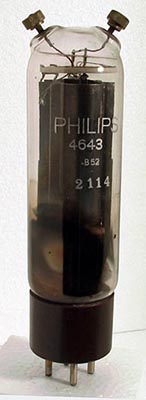|

My father, Gilbert Pollock, G2OY (later GM2OY,) had a couple of these 4643 valves which he had acquired in 1938 or early 1939. He used the pair of 4643's mainly on 20 metres AM and CW with up to 2,700V on the anode (CW) up until about 1962. I think the maximum frequency they could handle was about 20 MHz. Above that point, the internal capacitances were too high and he could not use them on 28 MHz, the band that was his real love.
He moved on to SSB in about 1962 but still did a lot of work on CW. Eventually the 4643s went soft and were replaced by more modern valves. However, they were never thrown away. Sadly, Gilbert became SK in 1985.
Background
He had originally been licensed as VK2XU in 1931 operating from Sydney. He and his new wife, Enid, my mother, went to the UK in 1937 where he worked for Mullard on the installation of large PA systems. A pair of Philips 4643s were used in these large audio amplifiers (500 watt?) that were made by Mullard.
On the outbreak of WWII, he volunteered and being a proficient CW operator, became a signals instructor and was based at Lydd in Kent.
However, being dis-satisfied with his conditions of service, he applied for his discharge which was granted (even though it was wartime!) He then joined the BBC as an engineer at their Scottish transmitting station at Westerglen, near Falkirk where I was born along with my elder sister and younger brother.
Our family remained in Falkirk until 1951 when we all migrated to Australia. That's when he became VK2FU.
I got my licence in 1963 as VK2WX. I went to London for postgraduate study in 1970, got my G call in 1973 as G4CGO. My younger brother, Adrian holds VK2FZ but as he now lives in Queensland he also has VK4OX but mainly works on VHF/UHF.
Some years ago a wrote a short account of what I remembered of my father's time at Westerglen and illustrated it with some of his old photographs.
I still love valves, particularly big transmitting valves. At least you can see what is going on with them. Not like transistors which to me are a bit like expensive fuses!
|